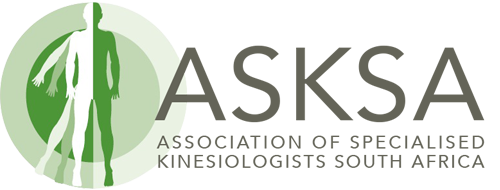If you would like to become an accredited Specialised Kinesiologist in South Africa, you will need to complete:
- A foundation course. Options include:
- Touch for Health – TFH 1 to 4 – (recommended by ASKSA as your first foundation course)
- Basic Kinesiology Practice – BKP 101-110
- At least two Specialised Kinesiology modalities. Your options include:
- Touch for Health Proficiency, Metaphors and Instructors
- Neuro-Training – (completion of modules 1 to 5, namely “Art of Solution-Oriented Neuro-training, Principles of Recuperation, Blueprints 1, Innate Intelligence and Integration)
- Neural Organisation Technique (Completion of NOT 1 to 4)
- The ICPKP Diploma course (Completion of 201 to 300)
- Other kinesiology studies which have been approved by our Standards Generating Body.
Sample path: Recommended Level One Syllabus:
Touch for Health & Neuro-training courses
- Touch For Health 1
- Touch For Health 2
- Art of Solution Oriented Neuro-Training
- Emotional Kinesiology 1
- Touch For Health 3
- Principles of Recuperation (Neuro-training)
- Touch For Health 4
- Emotional Kinesiology 2
- Blueprints 1 (Neuro-training)
- Blueprints 2 (Neuro-training)
- Care to Consult
- Innate Intelligence (Neuro-training)
- Integration (Neuro-training)
- Finger Modes Workshop
- Learn to Learn
Once the student has completed the first 12 workshops, the student will have enough hours to be termed an Active Kinesiologist in terms of the ASKSA rules and regulations. After completing the last Neuro-Training workshop, the Neuro-training workbooks and Assessments, the student receives an International Neuro -Trainer Certificate, issued by Neuro-Training Pty Ltd. which complies with the Australian National Certificate IV in Kinesiology, HLT 42812. The student may then enrol for more advanced courses listed below.
It is essential that you have Anatomy and Physiology training in order to become a Specialised Kinesiologist. If you have previous studies in A&P and have certificates to prove this, you can apply to be credited for your prior learning.
ICPKP Basic courses
- BKP 101 Energisers and Self Testing
- BKP 102 Manual Muscle Testing
- BKP 103 5 Elements Introduction – Yin Balance
- BKP 104 Kinesiology and Superficial Connections
- BKP 105 5 Elements – In-depth
- BKP 106 Professional Skills, Balancing Protocol with Database
- BKP 107 Pain Reduction
- BKP 108 History/Balancing with Food
- BKP 109 Advanced Muscle Techniques, Reactivity and Posture
- BKP 110 Client Health Records and Professional Relationships
- Clinical Body Contact
- Mastery of Emotional Stress Release
- Anatomy & Physiology 1
- Clinical Practice Management 1
- Clinical Practice Management 2
- Clinical Safe Practices
- Professional Communication Skills
- Treatment Planning & Assessment 1
Sample path: Recommended Level two Syllabus:
(You may also do any of the Advanced Workshops if you wish)
- Anatomy and Physiology 1-10
- Neural Organisation Technique 1
- Neural Organisation Technique 2 & 3
- Neural Organisation Technique 4
- Women’s Wellness (Neuro-training)
- Emotional Patterns (Neuro-training)
- Nutritional Alternatives (Neuro-training)
- Fears, Habits, Beliefs (Neuro-training)
- Effective Iridology (Neuro-training)
- Vision, Insight and Purpose (Neuro-training)
- Relationship Rescue
- Personal Charades
ICPKP Diploma course
- Muscle & Skin Activation
- Basic Brain Skills
- Lifestyle & Dietary Modification
- TMJ & Cranials
- Shoulder, Elbow, Hand Muscle Protocol
- Hip, Leg, Foot Muscle Protocol
- Head, Neck and Trunk Muscle Protocol
- Touch, Clothes and Environment
- Emotional Anatomy & Intelligence
- Immune Mismatch Responses: Allergies & Sensitivities
- Adrenal, Geopathic and Life Energy
- Cleansing & Detoxification
- Genetic & Meridian Emotional Release
- Subconscious Self Perception
- Ligaments and Joints
- Injury, Strain and Inflexibility
- Anatomy & Physiology 2: Chemistry, Biochemistry, Pathology
- Dietary & Nutritional Science
- Clinical Practice Management 3
- Clinical Practice Development 1
- Clinical Practice Development 2
- Treatment Planning & Assessment 2
Moderation and assessment
Continual development
Your instructors will assist ASKSA in maintaining a list of your accredited hours, but you may also keep track, with this spreadsheet. These accreditations, along with your annual Association membership fees, entitle you to list yourself and practice professionally, in terms of a standardised level of proficiency; a system that protects both the practitioner and their client.
